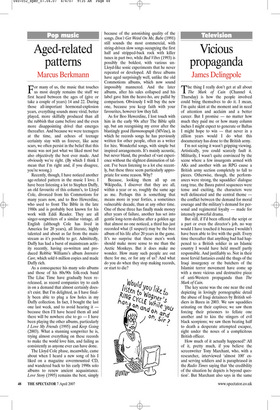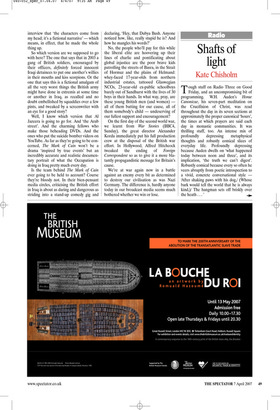Vicious propaganda
James Delingpole
The thing I really don’t get at all about The Mark of Cain (Channel 4, Thursday) is how the people involved could bring themselves to do it. I mean, I’m quite skint at the moment and in need of attention and acclaim and a better career. But I promise — no matter how much they paid me or how many column inches I might expect to generate or Baftas I might hope to win — that never in a zillion years would I do what this documentary has done to the British army.
I’m not saying it wasn’t gripping viewing. Artistically, you could scarcely fault it. Militarily, I wasn’t quite convinced by the scene where a few insurgents armed with AKs and another with an RPG cause a British army section completely to fall to pieces. Otherwise, though, the performances were strong, the squaddies’ dialogue rang true, the Basra patrol sequences were tense and exciting, the characters were well delineated and the central theme the conflict between the demand for moral courage and the military’s demand for personal and regimental loyalty — made for intensely powerful drama.
But still, if I’d been offered the script or a part or even the director’s job, no way would I have touched it because I wouldn’t have been able to live with the guilt. Every time thereafter that anything bad had happened to a British soldier in an Islamic country I would have held myself partly responsible. And justifiably so. Not in their most fervid fantasies could the thugs of the Iraqi insurgency or the butchers of the Islamist terror movement have come up with a more vicious and destructive piece of anti-Western propaganda than The Mark of Cain.
The key scene was the one near the end depicting in lovingly pornographic detail the abuse of Iraqi detainees by British soldiers in Basra in 2003. We saw squaddies urinating on their captives; we saw them forcing their prisoners to fellate one another and to kiss the stingers of evil black scorpions; we saw them beating half to death a desperate attempted escapee, right under the noses of a complicitous British officer.
How much of it actually happened? All of it, pretty much, if you believe the screenwriter Tony Marchant, who, with a researcher, interviewed ‘almost 100’ exand serving soldiers and is paraphrased in the Radio Times saying that ‘the credibility of the situation he depicts is beyond question’. But Marchant also says in the same interview that ‘the characters come from my head; it’s a fictional narrative’ — which means, in effect, that he made the whole thing up.
So which version are we supposed to go with here? The one that says that in 2003 a gang of British soldiers, encouraged by their officers, definitely forced innocent Iraqi detainees to put one another’s willies in their mouths and kiss scorpions. Or the one that says this is a fictional amalgam of all the very worst things the British army might have done in extremis at some time or another in Iraq, as recalled and no doubt embellished by squaddies over a few pints, and tweaked by a screenwriter with an eye for a good story?
Well, I know which version that Al Jazeera is going to go for. And ‘the Arab street’. And the charming fellows who make those beheading DVDs. And the ones who put the suicide bomber videos on YouTube. As far as they’re going to be concerned, The Mark of Cain won’t be a drama ‘inspired by true events’ but an incredibly accurate and realistic documentary portrait of what the Occupation is doing in Iraq pretty much every day.
Is the team behind The Mark of Cain ever going to be held to account? Course they’re bloody not. In their bien-pensant media circles, criticising the British effort in Iraq is about as daring and dangerous as striding into a stand-up comedy gig and declaring, ‘Hey, that Dubya Bush. Anyone noticed how, like, really stupid he is? And how he mangles his words?’ No, the people who’ll pay for this while the liberal elite are hoovering up their lines of charlie and pontificating about global injustice are the poor brave kids patrolling the streets of Basra, in the Strait of Hormuz and the plains of Helmand: whey-faced 17-year-olds from northern industrial estates, tattooed Glaswegian NCOs, 23-year-old ex-public schoolboys barely out of Sandhurst with the lives of 30 boys in their hands. In what way, pray, are these young British men (and women) all of them batting for our cause, all of them somebody’s child — undeserving of our fullest support and encouragement?
On the first day of the second world war, we learnt from War Stories (BBC4, Sunday), the great director Alexander Korda immediately put his full production crew at the disposal of the British war effort. In Hollywood, Alfred Hitchcock tweaked the ending of Foreign Correspondent so as to give it a more blatantly propagandistic message for Britain’s cause.
We’re at war again now in a battle against an enemy every bit as determined to destroy our civilisation as was Nazi Germany. The difference is, hardly anyone today in our broadcast media seems much bothered whether we win or lose.



































































 Previous page
Previous page